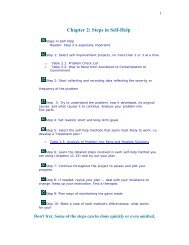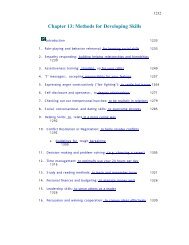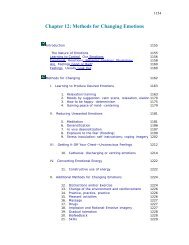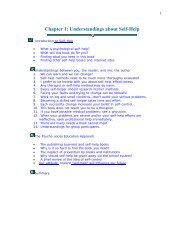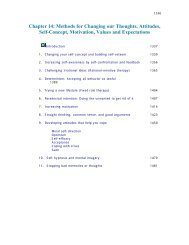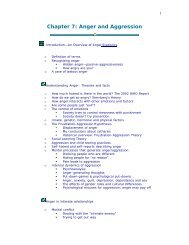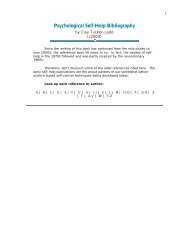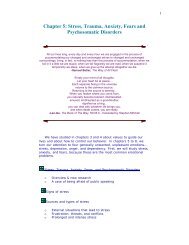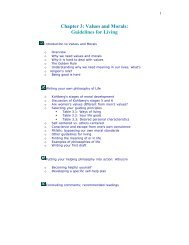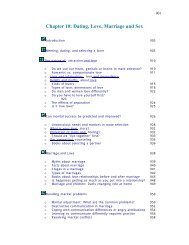Methods for Changing Behaviors - Psychological Self-Help
Methods for Changing Behaviors - Psychological Self-Help
Methods for Changing Behaviors - Psychological Self-Help
You also want an ePaper? Increase the reach of your titles
YUMPU automatically turns print PDFs into web optimized ePapers that Google loves.
Steps<br />
· To understand what in the environment is causing a behavior or<br />
emotion or interpersonal interaction. (If nothing external, look<br />
inside <strong>for</strong> thoughts, memories, feelings or physiological<br />
factors.)<br />
· To use this knowledge to figure out how to change the behavior<br />
or to determine why a self-help ef<strong>for</strong>t isn't working.<br />
STEP ONE: Remember the circumstances preceding the behavior<br />
or emotion or interaction.<br />
Think back and remember as much as possible about what<br />
happens right be<strong>for</strong>e the "target" behavior:<br />
· time and physical setting, any environmental cues that set you<br />
off--<br />
· your actions, thoughts (self-talk), and feelings--<br />
· any defeatist ideas, e.g. "I'll never get better," "I can't change,"<br />
"I'm just that way"--<br />
· others' behavior and feelings (including believing they think you<br />
are stupid, etc.)--<br />
· nature of interaction with others--<br />
· are there any signs of possible consequences (+ or -) that<br />
influence your behavior?<br />
· your physical condition (tired, hyper, drunk, etc.)--<br />
· your use of or lack of skills--<br />
· + or - expectations or values--<br />
· is this situation similar to a situation or person you have had<br />
experience with be<strong>for</strong>e?<br />
List the stimuli that seem to occur right be<strong>for</strong>e the behavior in<br />
question. In this method, you can concentrate on the antecedents of<br />
desired or unwanted behaviors, feelings, or interpersonal interactions.<br />
STEP TWO: Think about the possible + or - consequences<br />
following your behavior or emotion or interaction.<br />
It will also be helpful to consider the payoffs <strong>for</strong> both the unwanted<br />
and the desired behavior, perhaps comparing the two. If you are<br />
dealing with a bad habit, you may feel "I don't get anything positive<br />
out of the habit." Don't believe it; get started carefully observing the<br />
results of your habit. The positive pay offs outweigh the negative<br />
consequences. Each habit has its own unique set of positive and<br />
negative consequences. It is important to consider many possible<br />
consequences to uncover them all:<br />
1. desired pay offs--consider both extrinsic rewards (material,<br />
interpersonal, or symbolic of success) and intrinsic satisfaction<br />
(enjoyable feelings, relief, and self-esteem), both in the<br />
immediate and long range future. Often per<strong>for</strong>ming a well-<br />
1101



